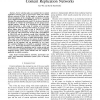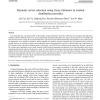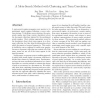100
click to vote
CN
1999
15 years 1 months ago
1999
Widespread replication of information can ameliorate the problem of server overloading but raises the allied question of server selection. Clients may be assigned to a replica in ...
119
click to vote
TON
2008
15 years 1 months ago
2008
Server selection plays an essential role in content replication networks, such as peer-to-peer (P2P) and content delivery networks (CDNs). In this paper, we perform an analytical i...
131
click to vote
COMCOM
2006
15 years 2 months ago
2006
To accommodate the exponential growth of Web traffic, Content Distribution Networks (CDN) have been designed and deployed to distribute content to different cache servers, and to ...
125
click to vote
CN
2006
15 years 2 months ago
2006
In this paper, we address the server selection problem for streaming applications on the Internet. The architecture we consider is similar to the content distribution networks con...
105
click to vote
DAIS
2003
15 years 3 months ago
2003
- Mobile agents have the ability to migrate through heterogeneous networks and execute at remote hosts. This ability can be exploited to improve the performance of agent based appl...
114
click to vote
ECIR
2010
Springer
15 years 3 months ago
2010
Springer
Abstract. Previous evaluations of server selection methods for federated search have either used metrics which are unconnected with user satisfaction, or have not been able to acco...
115
click to vote
DASFAA
2004
IEEE
15 years 5 months ago
2004
IEEE
A meta-search engine propagates user queries to its participant search engines following a server selection strategy. To facilitate server selection, the metasearch engine must ke...
121
click to vote
ICDCSW
2003
IEEE
15 years 7 months ago
2003
IEEE
Server replication is a common approach to improving the scalability of a service on the Internet. For this approach, the task of finding an appropriate server from a set of repli...
130
click to vote
CCGRID
2007
IEEE
15 years 8 months ago
2007
IEEE
Abstract— Scientific computing is being increasingly deployed over volunteer-based distributed computing environments consisting of idle resources on donated user machines. A fu...
112
click to vote
ICDS
2008
IEEE
15 years 8 months ago
2008
IEEE
In order to provide a generic, applicationindependent and resource-efficient framework for server redundancy and session failover, the IETF RSerPool WG is currently standardizing ...



